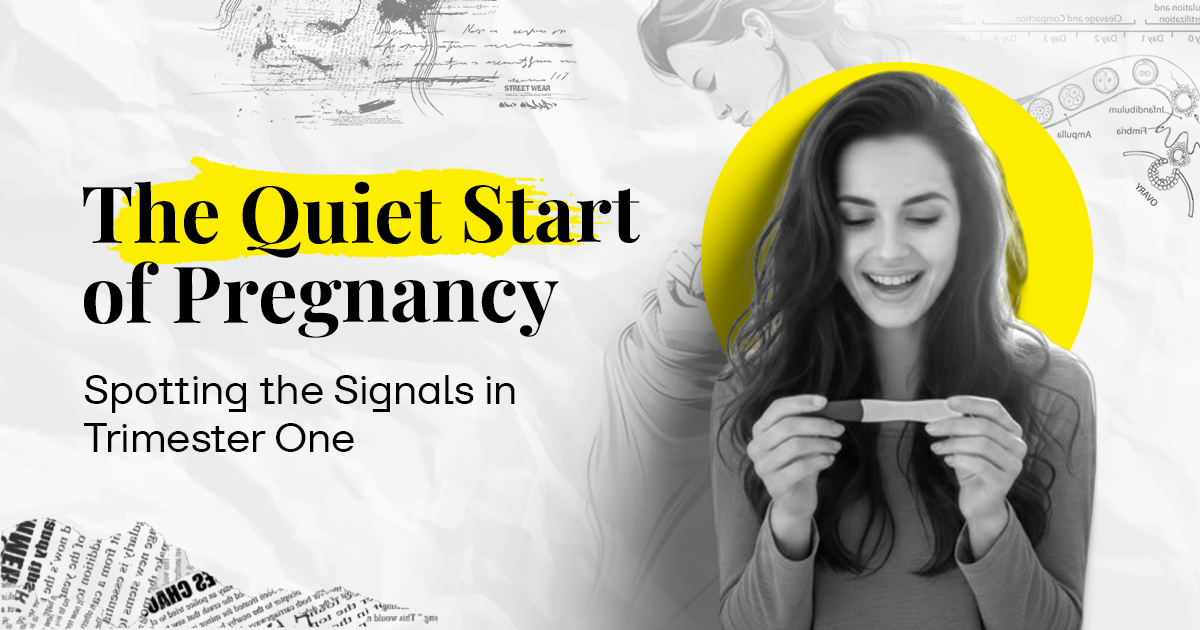Introduction
It has been a while since your last period and now your mind is filled with questions like: Am I pregnant? Is this a normal cycle delay?
The initial weeks of pregnancy are typically packed with anxiety. Many women anticipate obvious signs, such as nausea or morning sickness, to show immediately. However, the truth is that pregnancy often starts more subtly. In the first trimester, your body is prepping to undergo one of your life's most significant and amazing transformations, even though it may not seem or feel any different from the outside.
This phase can be challenging as many early changes resemble your regular menstrual cycle symptoms. Being aware of early symptoms doesn't just serve to amuse -- rather it allows you to become more self-aware about your body, identify patterns and take the necessary steps toward having a healthier pregnancy experience. Every journey starts somewhere; for pregnant mothers-to-be it starts in their first trimester of gestation.
Early Symptoms You Might Notice
Light Spotting or Cramping
A faint spotting, sometimes called implantation bleeding, may occur when a fertilized egg attaches to the uterine lining. It is usually lighter than your regular period and often comes with mild cramps.
Sudden Fatigue
Feeling exhausted for no apparent reason? Rising progesterone levels can tire you, even in these early weeks.
Nausea and Food Sensitivity
Although nausea in the morning is usually associated with the later stages, Certain women have mild nausea or notice themselves suddenly irritable to smells and tastes in the initial trimester.
Breast Tenderness
Your breasts may feel sore, fuller, or more sensitive. Many women mistake this for premenstrual changes, but it can also signal early pregnancy.
Mood Changes
Hormonal fluctuations may bring mood swings or heightened emotions, making you teary or irritable without knowing why.
Listening to Your Body
Because these symptoms overlap with regular menstrual cycle patterns, it is easy to dismiss them. If you suspect you might be pregnant, here are a few helpful steps:
Track your cycle carefully – Noting when your period is due and any changes in symptoms can help you.
Take a home pregnancy test – Some tests detect hormone changes quite early. If the result is unclear, wait a few days and test again.
Consult your doctor early – A quick check-up or blood test can accurately confirm pregnancy and help you plan the next steps. Fertility specialists like the team at Pratap IVF can guide you through this journey with expert advice.
Preparing for a Healthy Trimester Ahead
Eat balanced meals rich in fruits, vegetables, and whole grains.
Stay hydrated and include activities such as walking, strength training or yoga.
Avoid smoking, alcohol, and excessive caffeine.
Begin prenatal vitamins if recommended by your doctor.
These steps may seem simple, but significantly affect your pregnancy’s progress.
Why These Signs Matter
As your pregnancy unfolds, paying close attention to your body can make the first trimester less daunting. From taking tests or visiting doctors early on to developing healthier lifestyle practices – taking small actions early can set the course for an easier pregnancy journey.
Conclusion
Pregnancy does not always start bold and proclamatory – sometimes its first signs can be subtle signals, from light spotting to sudden fatigue, that are your body's way of telling you something new may be in store.
If you notice sudden, unusual changes to your cycle or health, do not ignore them! A simple test or consultation early can provide peace of mind and guide your course in an informed fashion. Pregnancy is about more than preparing for babies; it is also nurturing yourself. Starting early means better results both for yourself and for your growing life.


